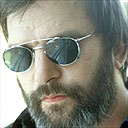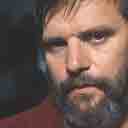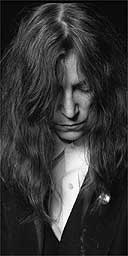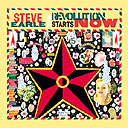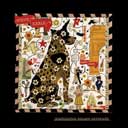He may be the most controversial singer-songwriter in America right now, an ex-junkie who was once hailed as the next Hank Williams, but Steve Earle refuses to look the part. The famous beard has gone; he walks on stage in glasses, looking like some academic or lawyer dressed for the weekend in his jeans and short-sleeved shirt. Tonight at the Barbican's Freedom Highway festival of political song, he has left behind his rock and bluegrass backing bands to play solo, using only his amplified acoustic guitar and the harmonicas stacked on the table behind him.
When he launches into his first song, it's not one of his country-rock hits or stories of injustice, but rather a growled, percussive version of the Pogues' If I Should Fall from Grace With God, given a menacing edge. "Shane MacGowan is one of the best songwriters in the world," he explains in his Texan drawl, "but no one can understand the words when he sings them."
Then he launches into his own work, balancing songs about American history with stories of hard times and suffering, occasionally throwing in unexpectedly painful and personal reminders of his past. There are songs about racism and about the problems of farmers (The Rain Came Down, written for the Farm Aid campaign). And there is Dixieland, a well-researched story of the civil war, with a decidedly subversive, class war edge. He switches tack yet again with Ellis Unit One, a death row horror story that reflects his own campaigns against the death penalty in America. Then, as a reminder of the tortuous career that led to his role as a radical campaigner, he talks about his life as a recovering heroin addict with a prison record. The slinky and autobiographical South Nashville Blues follows, driven on by his best guitar work of the night.
Now he is ready to move on to his main concern, the Iraq war. He attacks Blair as much as Bush, and he complains - in a colourful, but reasoned way - about the state of American politics: "You need right and left, and I certainly need the right to be there to balance my radical arse, but there is no left in my country, and we've got to fix that. It's up to us to change it." This is the lead-up to his bravest song to date, John Walker's Blues, a thoughtful, gently rousing inquiry into how someone who is "just an American boy" should (allegedly) have become a member of al-Qaida. He follows on with Jerusalem, his personal survey of the Middle East, and then cites a list of personal heroes that range from Abbie Hoffman to Ewan MacColl, before ending with Christmas in Washington and its plea for a return to radical idealism: "Come back Woody Guthrie." Steve Earle may be an isolated figure in the American music scene, but he is part of a grand tradition.

